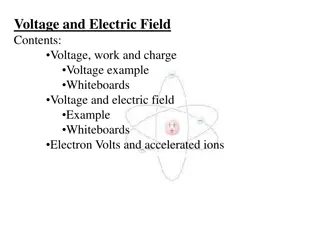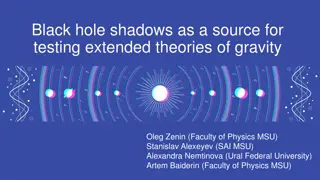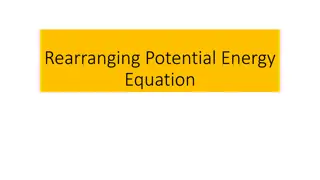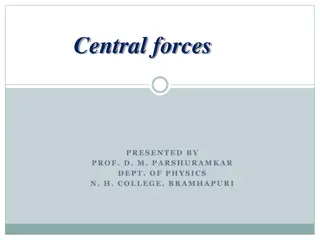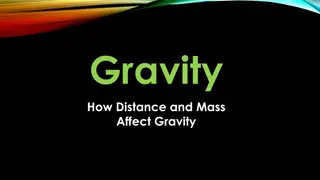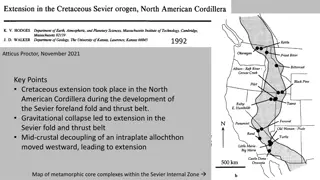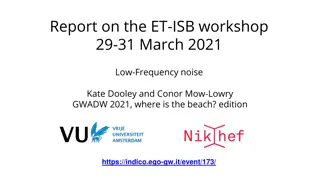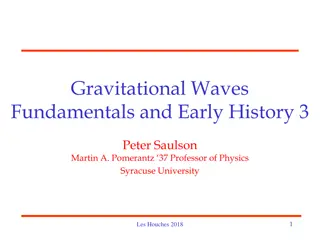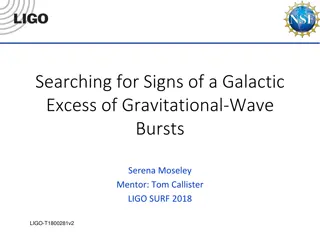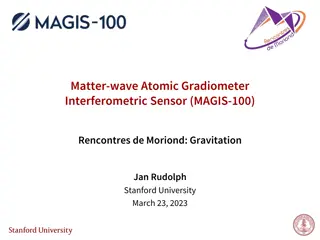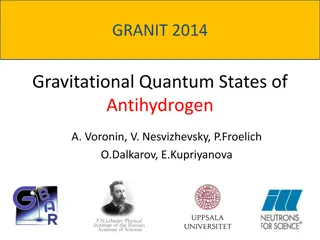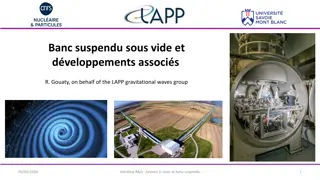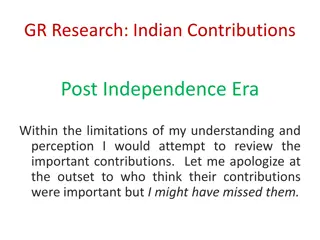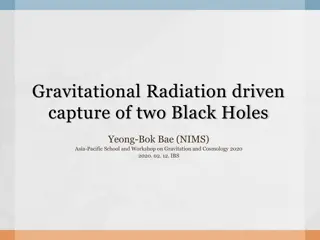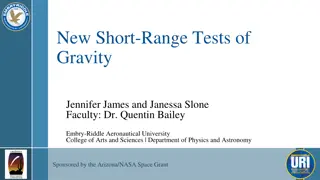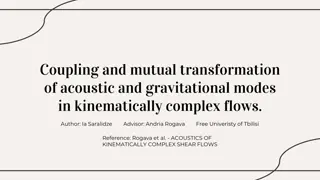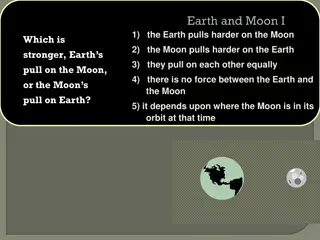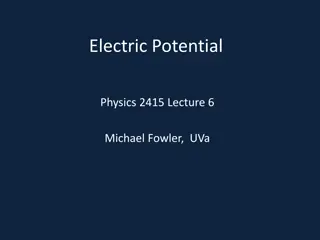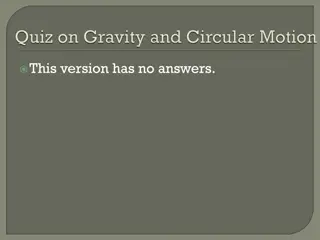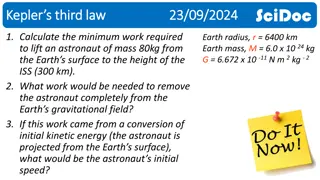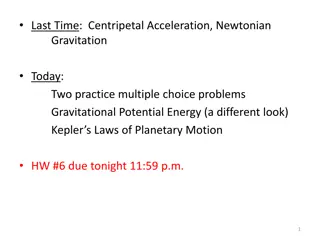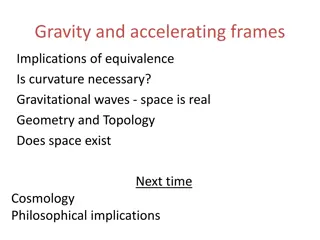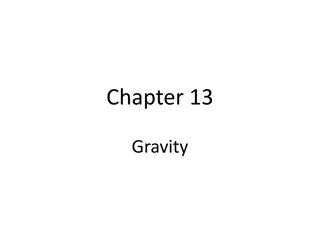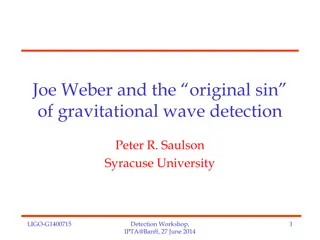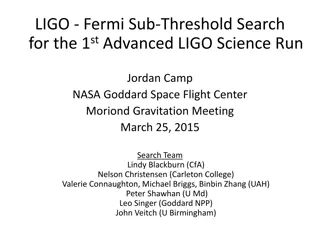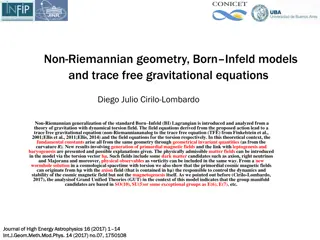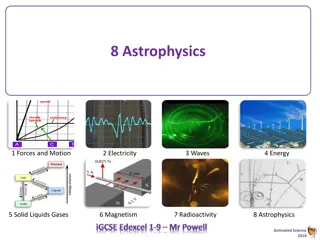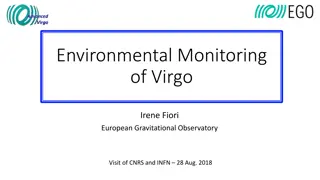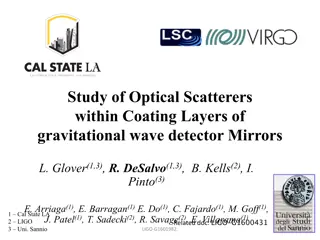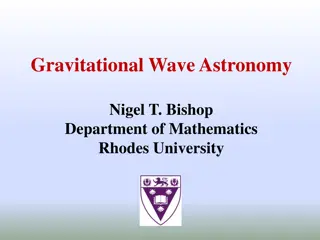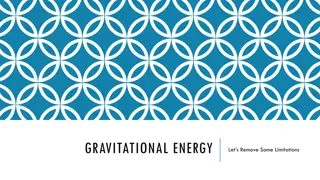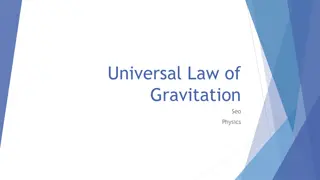Understanding Voltage and Electrical Potential in Physics
Explore the concepts of voltage, electrical potential, work, and charge through practical examples involving moving charges against electric and gravitational fields. Learn how to calculate voltage, work done, and gravitational potential changes in various scenarios. Dive into the world of electrica
3 views • 23 slides
Understanding Gravitational Anomalies and Interpretation Challenges
Gravitational anomalies pose an inverse problem in determining characteristics of underlying bodies. Surface gravity values provide insights into geometric shape, dimensions, density contrast, and depth. Interpreting anomalies requires integrating gravimetric analysis with other geological data. Cal
5 views • 62 slides
Testing Extended Theories of Gravity Using Black Hole Shadows
Exploring the shadows of black holes as a method to test extended theories of gravity, this study discusses the existence of black holes, gravitational wave astronomy, and direct imaging. Researchers Oleg Zenin, Stanislav Alexeyev, Alexandra Nemtinova, and Artem Baiderin present findings on black ho
5 views • 18 slides
Understanding Energy: Types, Potential, and Kinetic
Dive into the world of energy with a comprehensive guide covering the definition, types, and characteristics of gravitational, potential, and kinetic energy. Explore how energy is the driving force behind all work and movement, with examples and explanations provided for each energy type. Gain insig
2 views • 24 slides
Gravitational Potential Energy Equations and Examples
Learn how to rearrange the potential energy equation, calculate potential energy using the formula PE = mgh, and solve for mass and height in relation to gravitational potential energy. Explore examples of calculating potential energy for objects at different heights. Understand the concept of gravi
0 views • 11 slides
Understanding Central and Non-Central Forces in Physics
Newton's laws of motion introduced the concept of forces, leading to the classification of fundamental forces like gravitational, electromagnetic, strong nuclear, and weak nuclear forces. Central forces act toward or away from a fixed center, while non-central forces are affected by additional param
0 views • 7 slides
Understanding Gravitational Potential Energy
Explore the concept of gravitational potential energy and its relation to mass, height, and gravitational field strength. Learn about kinetic energy, equations for GPE, rearranged equations, and practical applications through examples and challenges.
1 views • 14 slides
Understanding Gravity: The Impact of Distance and Mass
Objects with mass exert gravitational force, influencing each other based on mass and distance. Gravity, a fundamental force, keeps objects like Earth and the moon in orbit and affects how objects fall towards each other. The relationship between distance and gravity is crucial, affecting the streng
0 views • 12 slides
Evolution of Sevier Orogeny and Cretaceous Extension in North American Cordillera
The Sevier Orogeny in the Cretaceous period led to extension in the North American Cordillera, with gravitational collapse playing a key role in the development of the Sevier fold and thrust belt. The internal zone consisted of metamorphic core complexes and Mesozoic-Paleogene plutons, showcasing ev
0 views • 5 slides
Insights from ET-ISB Workshop on Low-Frequency Noise and GWADW 2021
The ET Instrument Science Board held a workshop focusing on addressing key challenges related to low-frequency noise in gravitational wave detectors. Experts discussed topics such as mirror temperature, dealing with low-frequency noise realities, and facility limits. The workshop highlighted the sig
0 views • 13 slides
Understanding Shift Registers in Sequential Logic Circuits
Shift registers are sequential logic circuits used for storing digital data. They consist of interconnected flip-flops that shift data in a controlled manner. This article explores different types of shift registers such as Serial In - Serial Out, Serial In - Parallel Out, Parallel In - Serial Out,
2 views • 9 slides
Understanding Gravitational Waves: Basics and Detection Challenges
Exploring gravitational waves fundamentals, early history, and challenges in detection. Covers topics like interpreting noise power spectrum, shot noise in interferometers, radiation pressure, and quantum limits. Illustrates the importance of noise spectrum analysis and mathematical operations in un
0 views • 42 slides
Unveiling Galactic Excess in Gravitational-Wave Bursts
Investigate the presence of a galactic source emitting gravitational waves within the LIGO frequency range and develop techniques to detect and identify these signals. Employ simulations to differentiate between isotropic and galactic event distributions, aiming to enhance our understanding of the o
0 views • 30 slides
Cutting-Edge Developments in Gravitational Wave Detection at MAGIS-100
Discover the groundbreaking MAGIS-100 Matter-Wave Atomic Gradiometer Interferometric Sensor, a 100-meter baseline atom interferometer under construction at Fermilab. Explore the mid-band science potential, sky localization precision, and long-baseline AI applications for gravitational wave detection
0 views • 15 slides
Exploring Gravitational Quantum States of Antihydrogen
The research delves into the intriguing realm of gravitational quantum states of antihydrogen, posing questions about the feasibility of gravitational mass extraction from these states. Through topics like spectroscopy, interference, and time-spatial resolution, the study sheds light on the properti
0 views • 21 slides
Advances in Optical Bench Technology for Gravitational Wave Detectors
This content discusses the latest advancements in optical bench technology for gravitational wave detectors, focusing on precise measurements of back-scattered light, development of new optical cavities, and testing of Sagnac interferometers. Key objectives include improving suspension controls, red
0 views • 13 slides
Indian Contributions to General Relativity Post-Independence Era
Indian scholars have made significant contributions to the field of General Relativity post-independence, focusing on important problems like Big Bang singularity, gravitational collapse, black holes, gravitational waves, and quantum aspects. Notable achievements include AKR's Raychaudhury Equation,
0 views • 30 slides
Gravitational Radiation Driven Capture of Black Holes in Clusters
Explore the dynamics of black hole binary formation in clusters, focusing on gravitational radiation-driven capture processes. Delve into the implications of gravitational wave emissions on orbit transitions and energy radiation. Discover critical impact parameters and approaches to understanding th
3 views • 21 slides
Short-Range Tests of Gravity: Theoretical Physics Project Overview
This project focuses on calculating modifications to the Newtonian gravitational force through experimental short-range tests of gravity. Utilizing the Standard-Model Extension (SME) test framework to search for potential violations of General Relativity and Newtonian Gravity. Key objectives include
1 views • 7 slides
Understanding the Acceleration of the Universe and the Equivalence Principle Violation in the Horndeski Vector-Tensor Theory
Exploring the implications of the Equivalence Principle Violation after reheating in the context of the accelerated expansion of the universe. The study delves into the Horndeski vector-tensor theory, gravitational waves, and the impact of modified gravity and dark energy. Insights are provided on t
2 views • 20 slides
Coupling and Mutual Transformation of Acoustic and Gravitational Modes in Kinematically Complex Flows
This study explores the coupling and mutual transformation of acoustic and gravitational modes in kinematically complex flows. The research delves into phenomena such as stratified fluid, internal gravity waves, and formalism related to background flow and compressible cases. The presentation plan c
0 views • 20 slides
Understanding Gravitational Forces Between Earth and Moon
Exploring the gravitational forces between Earth and the Moon, we learn that they pull on each other equally due to Newton's 3rd Law. The force depends on the distance squared, meaning doubling the distance reduces the force by a factor of 4. When in an airplane at high altitude, your weight is less
1 views • 21 slides
Understanding Electric Potential and Gravitational Energy in Physics
Explore the concepts of electric potential and gravitational energy in physics through insights on lifting a rock, potential energy of charges, and more. Learn about the similarities between gravitational and electric fields, as well as the definition of potential, potential energy, and work in thes
0 views • 20 slides
Final Exam Review and Topics for Success
Prepare for your upcoming final exam with detailed information on a lunar occultation of Mars and essential topics to study. Learn about gravitational waves, radioactive decay, and gravitational red shift calculations. Utilize study guides and previous exam reviews to excel in your exam. Don't miss
0 views • 7 slides
Red Cross Shelter Partnership Initiative in Missouri
The Red Cross supports a Faith-Based Organization (FBO) Initiative in Missouri, inviting organizations to assist primarily in sheltering efforts for disaster response in the community. The National Shelter System shows numerous Red Cross shelters in Missouri, with advantages to partnering with the R
0 views • 16 slides
Concepts in Gravitational Forces and Celestial Bodies
This informative content delves into various concepts related to gravitational forces and interactions between celestial bodies like the Earth and the Moon. It covers topics such as the comparison of gravitational pulls, forces in concentric orbits, weight measurements in different scenarios, and th
0 views • 11 slides
Understanding Kepler's Third Law and Gravitational Work
Kepler's third law relates the orbital period of a planet to its distance from the Sun. In this scenario, we calculate the work required to lift an astronaut from Earth to the ISS and remove them from Earth's gravitational field. We also determine the initial speed needed to project the astronaut fr
0 views • 14 slides
Understanding Gravitational Potential Energy and Negative Potential Energy
Exploring the concept of gravitational potential energy beyond the surface of Earth, understanding how potential energy varies with distance from the Earth's center, and delving into the significance of negative potential energy at certain points. Learn about the calculations involved, including the
0 views • 17 slides
Exploring Gravitational Effects and Space Curvature in Accelerating Frames
Explore the implications of equivalence in gravitational effects like redshift, time-warp, and space-warp in accelerating frames. Understand how the curvature of space is linked to non-uniform gravitational fields. Dive into observations confirming these phenomena, shedding light on the nature of sp
0 views • 30 slides
Understanding Gravity and its Applications
Explore the fascinating world of gravity through topics like the law of gravity, gravitational force, superposition, and more. Dive into concepts such as net gravitational force, acceleration due to gravity, and gravitational forces in various scenarios. Understand how gravity influences objects in
0 views • 68 slides
The Legacy of Joe Weber in Gravitational Wave Detection
Joe Weber, a key figure in the history of gravitational wave detection, made significant original contributions to the field, despite facing conflicts and challenges. His groundbreaking work laid the foundation for future advancements in the detection of gravitational waves. The story of Joe Weber's
1 views • 19 slides
Advanced LIGO and Short Gamma-Ray Burst Search Overview
Advanced LIGO is focused on achieving a lower noise level and higher sensitivity to detect gravitational waves. The search involves analyzing data from the 1st Advanced LIGO Science Run, collaboration with Fermi, and seeking coincident detections of gravitational waves and gamma-ray bursts, particul
0 views • 13 slides
Non-Riemannian Geometry and Born-Infeld Models in Gravitational Theory
In this paper by Diego Julio Cirilo-Lombardo, a non-Riemannian generalization of the Born-Infeld Lagrangian is introduced in the context of gravitation with a dynamical torsion field. The resulting field equations lead to a trace-free gravitational equation and provide insights into primordial magne
0 views • 34 slides
Understanding Astrophysics: Forces, Motion, and Gravitational Fields
Explore the realm of astrophysics through forces, motion, energy, and gravitational fields. Delve into topics like orbits, velocity, and the fundamental units of measurement, all depicted in engaging visual representations. Gain insights into the vastness of the universe, galaxies, stars, and planet
0 views • 9 slides
Environmental Monitoring of Virgo Irene Fiori European Gravitational Observatory Visit
The environmental monitoring of Virgo at the European Gravitational Observatory involves studying various environmental influences on the interferometer, such as electromagnetic fields, radio waves, ground motion, and mechanical vibrations. Sensors are strategically placed in experimental halls to d
0 views • 12 slides
Study of Optical Scatterers Within Coating Layers of Gravitational Wave Detector Mirrors
Analyzing scattering points within Advanced LIGO mirror coatings revealed unexpected weak scatterers, potentially influencing energy losses and thermal noise in gravitational wave detectors. Individual scatterers were identified using DAOPHOT, an algorithm originally created for astronomy, to pinpoi
0 views • 23 slides
Unveiling the Fascinating History and Science of Gravitational Wave Astronomy
Delve into the intriguing world of gravitational wave astronomy, from Einstein's initial predictions in 1916 to the recent breakthroughs in detecting these elusive waves. Explore the generation of gravitational waves, their impact on matter, and the key players in unraveling the mysteries of the uni
0 views • 44 slides
Exploring Gravitational Energy and Its Limitations
Delve into the concept of gravitational energy, its practical applications, and limitations. Understand the relationship between gravity, work, and energy in a gravitational field, while also exploring topics such as escape energy, escape speed, binding energy, and the preservation of mechanical ene
0 views • 37 slides
Understanding Universal Law of Gravitation in Physics
Explore the concept of Universal Law of Gravitation in Physics, including gravitational force, gravitational attraction between objects, and gravitational field strength. Learn to calculate these values with equations and examples showcasing the fundamental principles of gravity.
0 views • 9 slides
Understanding Gravity and Inverse Square Relationships in Physics
Explore the concepts of gravitational field, potential, geostationary orbits, escape velocity, and the inverse square relationship in Newton's Law of Universal Gravitation. Discover how mass and distance affect gravitational force and learn about nonuniform gravitational fields and equipotential lin
0 views • 22 slides
